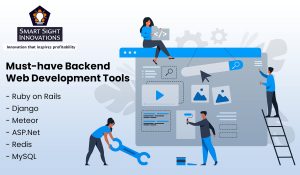 The present-day web developers are familiar with multiple tools that help them build robust solutions based on the purpose of the website. They are also knowledgeable about many aspects of web development such as UI and UX best practices, mobile app design, prototyping and wireframing to name a few.
The present-day web developers are familiar with multiple tools that help them build robust solutions based on the purpose of the website. They are also knowledgeable about many aspects of web development such as UI and UX best practices, mobile app design, prototyping and wireframing to name a few.
Building a seamless backend architecture is one thing, but it is also important to ensure how it will work in the real world after it is taken live. For this, developers must also use the best tools for debugging and testing to ensure a smooth user experience.
We list some of the most important backend web development tools to be able to build the best solutions across industry segments.
Ruby on Rails
Ruby on Rails is the preferred backend language for most developers that is easy to read, test, deploy and maintain. Rails is used in several server-side web apps and is the language of choice used by many known brands such as Shopify, Hulu and Square. It offers an intuitive workflow that helps developers easily integrate third-party applications for increased functionality.
Django
With a file structure that is extremely light, Django helps accelerate processing – something that makes it immensely popular when it comes to server-side development. Many large brands across the world such as Uber, Instagram and Reddit depend on this framework built on Python.
Applications built using Django are highly secure and easily scalable, thus making them ideal for businesses of all sizes – right from early startups to established enterprises. With a focus to help developers build more with less code, Django is especially useful for businesses that wish to go live at the earliest.
The vast community of developers contributes wholeheartedly to the project, a perfect example of which is the 4000+ packages that users can choose from for free.
Meteor
Another free and open-source framework. Although it can be used for both frontend and backend solutions, Meteor is vastly considered as one of the best backend development frameworks for web, mobile and desktop applications. One of the biggest advantages of Meteor is that it can be easily assimilated with other tech stacks and also gives developers real-time information to monitor the app performance. The framework has over 14,000 packages that have cumulatively been installed over a million times and is trusted by renowned organizations such as Qualcomm, Honeywell and Ikea among others.
ASP.Net
Introduced by Microsoft, ASP.Net is an open-source framework to build web apps. It is slightly unusual in that it uses C# for its development efforts, as compared to other frameworks that use JavaScript.
Redis
Redis is another open-source framework that supports many programming languages such as PHP, Python and JavaScript. It’s very efficient when it comes to handling voluminous databases. It does this by reducing requests and increasing site speeds and is the preferred choice for social media giants such as Pinterest and Twitter.
MySQL
MySQL is one of the most widely used relational databases in the world and is part of one of the most popular backend tech stacks – LAMP. It is an easy-to-learn framework that is available free of cost. It is renowned for its scalability and is the first choice for many backend developers when it comes to building a database management system.














